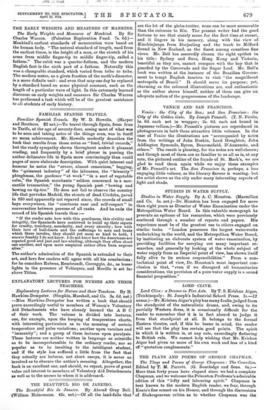FAMILIAR SPANISH TRAVELS.
Familiar Spanish Travels. By W. D. Howells. (Harper and Brothers. $2 net.)—To travel through Spain, from lean to Tarifa, at the age of seventy-four, seeing most of what was to be seen and taking notes of the things seen, was in itself no mean achievement. Mr. Howells modestly describes the book that results from those notes as "fond, trivial records," but the ready sympathy shown throughout makes it pleasant reading, and frequently by a brief phrase in passing the author delineates life in Spain more convincingly than could pages of more elaborate description. With quiet interest and humour he notes the "severe, almost censorious," begging, the "quiescent industry" of the labourers, the "leisurely" ploughman, the gardener " at work" "in a sort of vegetable calm," the Spanish merchants " seldom concerned in a mer- cantile transaction," the young Spanish poet ." bowing and bowing on tip-toe." He does not fail to observe the country life that pervades Madrid, the streets of dead Cordoba, paved in 850 and apparently not repaved since, the crowds of small boys everywhere, the "courteous ease and self-respect" in conversation between persons of all ranks. And he ends the record of his Spanish travels thus :—
" If the reader asks how with this gentleness, this civility and integrity, the Spaniards have contrived to build up their repute for cruelty, treachery, mendacity, and every atrocity; how with their love of bull-feasts and the sufferings to man and brute which these involve, they should yet seem so kind to both, I answer frankly I do not know. I do not know how the Americans are reputed good and just and law-abiding, although they often shoot one another, and upon mere suspicion rather often burn negroes alive."
The author's admiration of the Spanish is extended to their art, and here few readers will agree with all his conclusions ; for be considers Rubens, Rembrandt, Correggio, 81e., as lesser lights in the presence of Veltizquez, and Murillo is set far above Titian.


























































 Previous page
Previous page